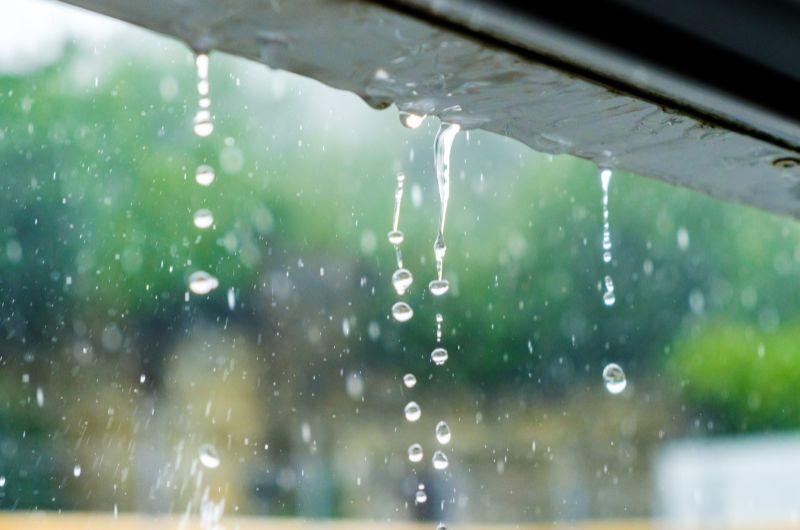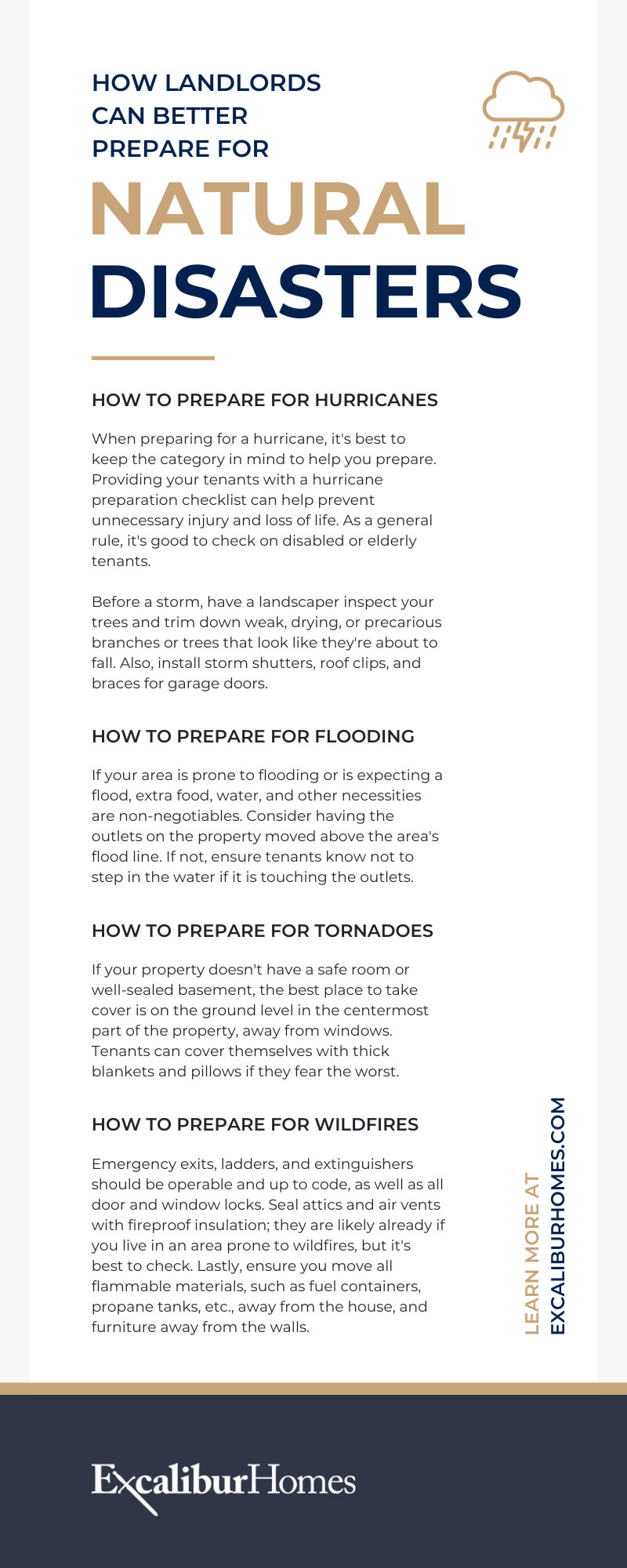
Hurricanes, tornadoes, and wildfires are some of the most common natural disasters in the United States. As a responsible landlord, you must determine whether you’re in a high-risk area and prepare accordingly. Here in Georgia, our state is technically a part of Dixie Alley and is susceptible to these natural disasters, which means landlords have their hands full. To help you better protect tenants and your rental property, this article will review how landlords can better prepare for natural disasters.
General Preparation Guidelines
Ideally, you’d have renters purchase their own insurance upon signing the lease agreement long beforehand, but if you haven’t, landlord’s insurance can still protect you. This coverage can protect you from property damage by ensuring you don’t have to pay for damages out of pocket. In some situations, you may lose income, as some tenants may request to terminate the lease or be unable to pay their lease on time after a particularly harsh disaster. Ultimately, it is best to require renter’s insurance, as it can protect them from having to pay for all lost belongings.
In the same vein of protecting tenants, you should also ensure that your lease agreement has a natural disaster clause. This clause will state whether a tenant can terminate their lease or abate rent in the event of a natural disaster. It should also state any plans of action and expectations of you and your tenants. If you don’t have a natural disaster clause, encourage your tenants to prepare by creating an emergency kit and an exit plan. Remind them to take pictures of the property beforehand, know evacuation routes, and protect their important papers and valuables.
Once you’ve done your best to protect and communicate with tenants, it’s time to prepare the property itself. As a few general rules, you should ensure that properties and protection mechanisms are up to code and that you’ve addressed the maintenance concerns of tenants. No one wants to deal with a sink or shower that won’t work while prepping for a natural disaster. Make sure to check the exterior and interior of the property, as well as fire extinguishers, smoke detectors, generators, and other critical machinery.
How To Prepare for Hurricanes
When preparing for a hurricane, it’s best to keep the category in mind to help you prepare. For example, it’s unlikely a category one (74-95 MPH winds) will cause mass power outages, but a category three certainly can. You should also pay attention to your area’s history and power grid, as some areas are more prone to outages than others. Providing your tenants with a hurricane preparation checklist can help prevent unnecessary injury and loss of life. As a general rule, it’s good to check on disabled or elderly tenants.
Hurricanes tend to throw around debris, turning a harmless branch into dangerous shrapnel rather quickly. Before a storm, have a landscaper inspect your trees and trim down weak, drying, or precarious branches or trees that look like they’re about to fall. Also, install storm shutters, roof clips, and braces for garage doors. It’s also wise to clean the gutters and tie down any outdoor furniture.
How To Prepare for Flooding
States that often experience hurricanes are the most at risk for flooding, so follow the guidelines listed under “How To Prepare for Hurricanes” as well. However, if your area is prone to flooding or is expecting a flood, extra food, water, and other necessities are non-negotiables. In some cases, people get stranded for days before rescue arrives, so having extra supplies and an emergency plan can save lives.
Consider having the outlets on the property moved above the area’s flood line. If not, ensure tenants know not to step in the water if it is touching the outlets. Water can also cause outlets to short, and if you have an older building or it isn’t up to code, this can cause the house to catch on fire. Tie down or anchor loose outdoor furniture and other items.
How To Prepare for Tornadoes
If tornadoes are likely to form, ensure that your tenants know where to hide, have a first aid kit, and have stored essential belongings. If your property doesn’t have a safe room or well-sealed basement, the best place to take cover is on the ground level in the centermost part of the property, away from windows. Tenants can cover themselves with thick blankets and pillows if they fear the worst.
Use bolts and wall studs to secure the exterior walls to the foundation, and roof clips to prevent roofs from lifting or coming off entirely. Trim trees and branches away from any nearby power lines. Keep furniture away from the windows, and secure shelving as well as appliances.
How To Prepare for Wildfires
For wildfires, having an evacuation plan is often critical for survival, as they can spread quickly and without mercy. In this instance, you cannot do much to prevent the house from catching fire, but you can mitigate the amount of damage done. Emergency exits, ladders, and extinguishers should be operable and up to code, as well as all door and window locks. Seal attics and air vents with fireproof insulation; they are likely already if you live in an area prone to wildfires, but it’s best to check. Lastly, ensure you move all flammable materials, such as fuel containers, propane tanks, etc., away from the house, and furniture away from the walls.
What To Expect in the Aftermath
After the disaster, there are a few scenarios to prepare for, as the property may be: habitable, uninhabitable, or partially habitable. Ideally, your lease should outline the steps to take and what you expect depending on the outcome, but there are a few things to keep in mind. The tenant may still struggle to pay rent even if the property is habitable. While you can legally demand the same amount, it’s considered harsh, so treat the situation delicately.
If the property is partially habitable and parts of the property are unusable, you must reduce the rent proportionately. For example, if an entire bedroom and bathroom are completely inoperable, you can’t expect a tenant to continue to pay for a three-bedroom, two-bathroom house. However, if the property is completely uninhabitable, the steps to take change based on how long it will take to repair the property. If the property is only temporarily uninhabitable, it is up to the tenant to find housing, but remember to discuss with them how to proceed with rent. If the house is uninhabitable permanently or for an indeterminate amount of time, the landlord should terminate the lease.
Learning how to better prepare for natural disasters as a landlord doesn’t just protect your investment– it protects tenants’ lives. If you’re still unsure how to proceed or need help forming a plan of action for your property, Excalibur Homes can help. We’re a property management company based in Marietta, Georgia, and we’re no strangers to natural disasters. We can help find the best ways to protect your property and tenants for better peace of mind.




